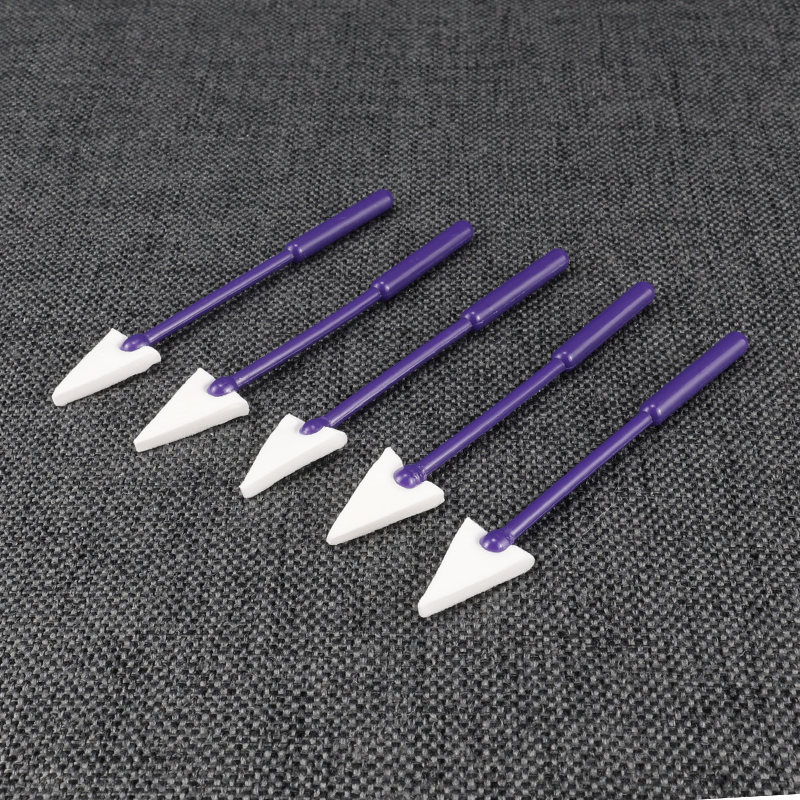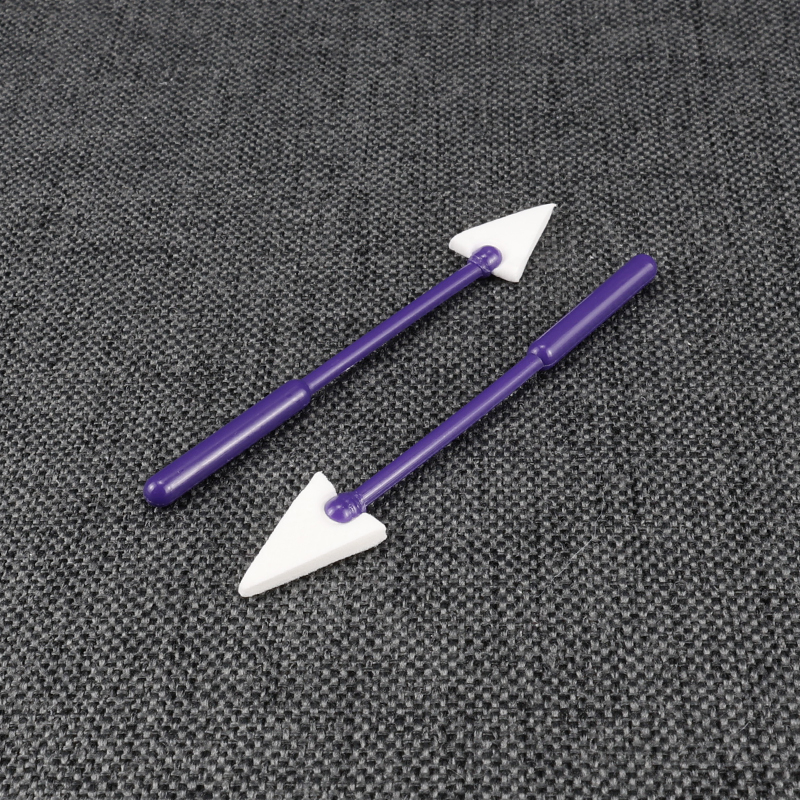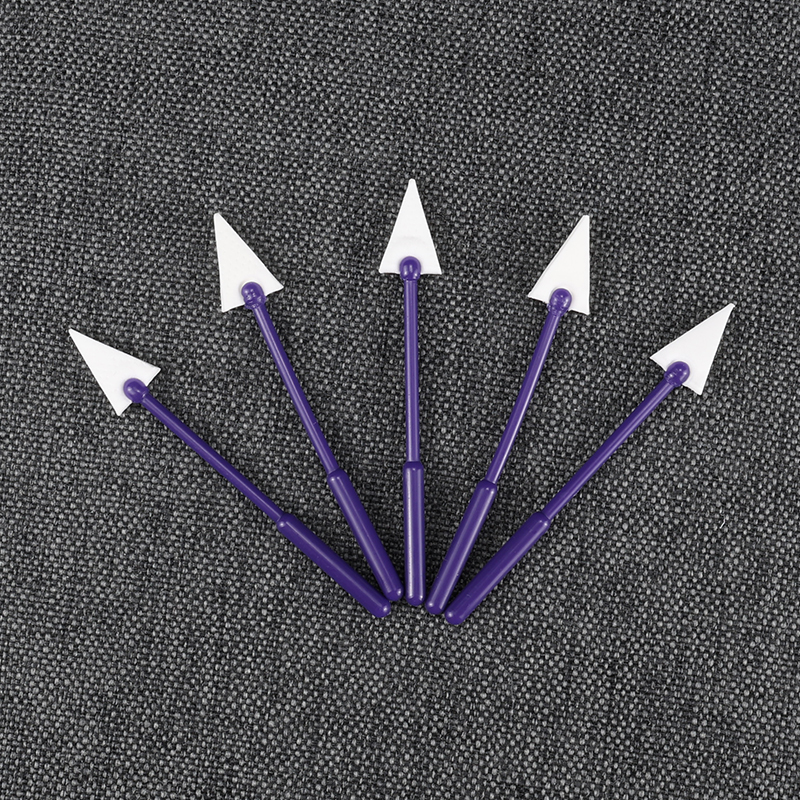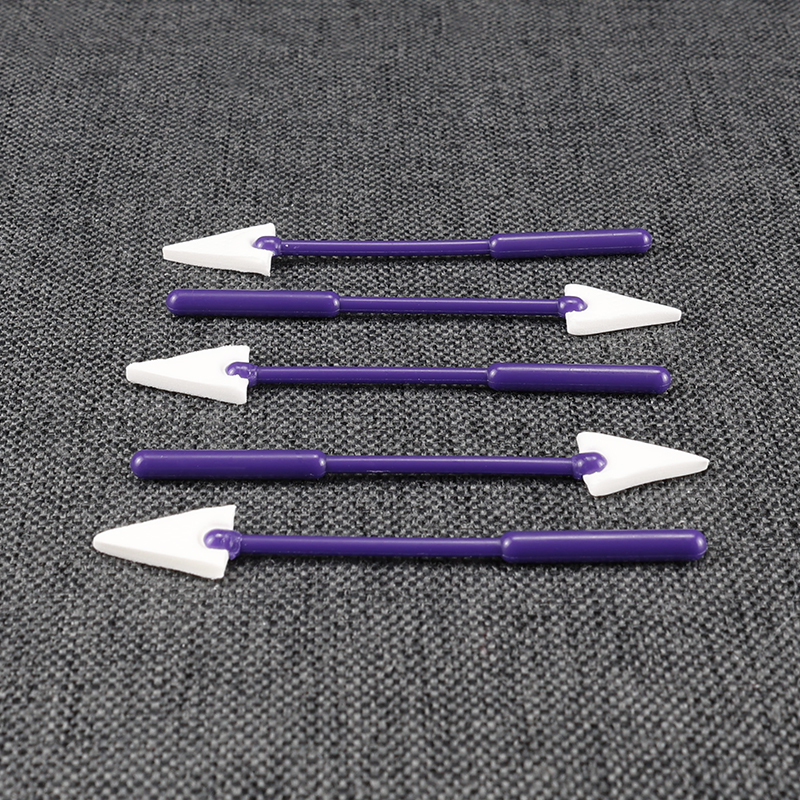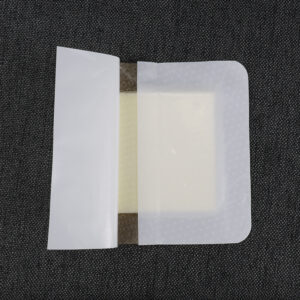Introduction to Disposable Triangular Cotton Swabs
Disposable triangular cotton swabs are specialized medical tools widely utilized in various healthcare settings, particularly in ophthalmology. Their unique design, characterized by a triangular head, offers several advantages that enhance their effectiveness compared to traditional swabs. The triangular shape allows for improved maneuverability and precision when applying or absorbing liquids, which is critical in delicate areas such as the eyes.
One of the primary purposes of these cotton swabs is to facilitate the safe and effective management of fluids. In ophthalmic care, where sterility and precision are paramount, the use of disposable triangular cotton swabs ensures that medical professionals can administer treatments, clean debris, or collect samples without risking cross-contamination. The disposable nature of these swabs eliminates the potential for re-use hazards, making them a vital component of infection control protocols.
The triangular head design contributes to optimal liquid absorption, enabling healthcare practitioners to manage larger quantities of fluids efficiently. This shape not only enhances fluid uptake but also allows for better access to angular or hard-to-reach areas, such as the corners of the eyes. Consequently, the hygienic construction and superior functionality of disposable triangular cotton swabs make them indispensable tools in both routine examinations and advanced ophthalmic procedures.
Furthermore, the use of these swabs aligns with broader medical practices aimed at ensuring patient safety while providing high-quality care. Their integration into everyday practice reflects a growing emphasis on utilizing specialized instruments tailored to the unique demands of various medical fields. In conclusion, disposable triangular cotton swabs are essential in ophthalmic care and broader medical applications, combining convenience, efficiency, and precision for optimal patient outcomes.
The Role of Vinyl Alcohol Sponge Heads in Medical Cotton Swabs
In the realm of ophthalmic care, the material composition of medical cotton swabs plays a crucial role in ensuring safety and effectiveness during procedures. Vinyl alcohol, a synthetic polymer, has emerged as a preferred material for sponge heads on these swabs. This choice is primarily attributed to its superior absorbency, softness, and biocompatibility, which collectively enhance the swabs’ performance in delicate medical applications.
One of the significant advantages of vinyl alcohol sponge heads is their excellent absorbency. This quality allows them to efficiently absorb fluids, which is essential when performing procedures that involve administering eye drops or cleaning ocular surfaces. Their high absorbency ensures that the swabs can hold adequate amounts of solution, facilitating precise applications while minimizing the risk of contamination or overflow.
Furthermore, the softness of vinyl alcohol sponge heads contributes to patient comfort during ophthalmic procedures. The gentle texture reduces the risk of irritation or injury to sensitive eye areas, which is particularly important in ophthalmic care where precision is pivotal. Patients are more likely to tolerate procedures involving these swabs, thereby enhancing compliance and overall patient experience.
Biocompatibility is another critical characteristic of vinyl alcohol. This property ensures that the sponge heads do not elicit adverse reactions when in contact with ocular tissues. As ophthalmic care often involves direct contact with sensitive tissues, the use of biocompatible materials like vinyl alcohol is paramount to maintaining safety standards in medical practices.
In conclusion, the incorporation of vinyl alcohol sponge heads in medical cotton swabs significantly boosts their functionality and reliability in ophthalmic care. Their absorbency, softness, and biocompatibility make them an invaluable asset in ensuring patient safety and enhancing the overall quality of ophthalmic procedures.
Application of Disposable Triangular Cotton Swabs in Ophthalmic Practices
Disposable triangular cotton swabs serve crucial functions in ophthalmic medical practices, facilitating various tasks with precision and care. Their design, which features a triangular tip, allows for enhanced maneuverability in small and delicate areas like the eye, making them indispensable tools in ocular health care. One of the primary applications of these swabs is the application of topical medications, such as antibiotic drops or anesthetic agents. The triangular shape enables practitioners to deliver medications accurately to the intended site, reducing the risk of contamination and ensuring effective treatment.
Moreover, disposable triangular cotton swabs are extensively used during eye examinations. Their versatility allows healthcare professionals to perform a range of assessments, from examining the cornea to checking for foreign bodies in the eye. The fine tips ensure that any necessary manipulation is performed gently, minimizing discomfort for patients during the examination. As a result, these swabs play a significant role in improving the accuracy of diagnostic assessments, which is critical in maintaining ocular health.
Additionally, hygiene is paramount in ophthalmic care, and disposable triangular cotton swabs contribute significantly to maintaining a sterile environment. They are employed to clean the ocular surface and surrounding areas, effectively removing debris or secretions without risk of cross-contamination that could arise when using reusable instruments. This not only protects patients from potential infections but also enhances their overall treatment experience. By integrating these swabs into standard practices, ophthalmic professionals can ensure that they uphold the highest standards of care while promoting patient safety and comfort.
Benefits of Using Disposable Swabs Over Reusable Options
The use of disposable triangular cotton swabs in ophthalmic care presents several compelling advantages compared to traditional reusable options. One of the most significant benefits is the enhancement of infection control practices. In healthcare settings, maintaining a sterile environment is paramount to patient safety. Disposable swabs are designed for single-use and are individually packaged to minimize the risk of contamination. In contrast, reusable swabs may carry the potential for harboring pathogens even after cleaning, which can pose an infection risk during clinical procedures.
Another advantage of disposable swabs is their inherent convenience. Healthcare professionals often work in fast-paced environments and require tools that are ready for immediate use. Disposable cotton swabs eliminate the need for time-consuming cleaning and sterilization processes associated with reusable swabs. This allows practitioners to streamline their workflow, ultimately aiding in patient throughput and improving overall care delivery.
Cost-effectiveness is an additional factor to consider when comparing disposable swabs to their reusable counterparts. Although the initial investment for disposable options might seem higher, they often lead to savings in the long term. The expenses incurred from cleaning, sterilizing, and maintaining reusable swabs, alongside potential costs related to infection control breaches, can surpass the straightforward expense of purchasing disposables. Given the increasing emphasis on hygiene in healthcare environments, the dependable nature of disposable cotton swabs contributes significantly to better compliance with hygiene protocols.
Lastly, the elimination of cross-contamination risks reinforces the preference for disposable options in ophthalmic care. The use of single-use swabs ensures that each patient receives a completely sterile tool, thus upholding high hygiene standards. The collective benefits of using disposable triangular cotton swabs underscore their critical role in effective ophthalmic care and highlight the importance of prioritizing patient safety through better infection control practices.
Conclusion and Best Practices for Using Disposable Triangular Cotton Swabs
In summary, disposable triangular cotton swabs play a vital role in ophthalmic care, assisting healthcare professionals in a variety of tasks that necessitate precision and gentleness. Their unique triangular shape allows for better access to compact areas of the eyes, minimizing the risk of damage to delicate tissues. It is essential to utilize these tools effectively to ensure optimal patient outcomes. Therefore, adhering to best practices regarding their usage is crucial.
Firstly, healthcare providers should ensure that they only use sterile disposable triangular cotton swabs from reputable manufacturers. Proper storage away from moisture and direct light preserves their sterility until use. Secondly, when utilizing these swabs for ocular purposes, it is essential to use a gentle touch to avoid causing any undue discomfort to the patient. Using the cotton swab in a controlled manner can help prevent injury to the ocular surface.
Furthermore, once a swab has been used, it must be disposed of immediately in accordance with biohazard waste protocols. Improper disposal can lead to contamination or infections, which are detrimental to patient health and safety. Health professionals should also educate patients on the importance of using only disposable triangular cotton swabs for personal use, emphasizing that these tools should not be reused.
Lastly, continuous training and updating knowledge about the products available in the market will ensure that healthcare professionals remain informed about the best practices related to these swabs. Regularly reviewing the protocols for their use within an ophthalmic setting enhances patient care and safety. Thus, by implementing these guidelines, professionals can maintain a high standard of hygiene and efficacy in ophthalmic care.

